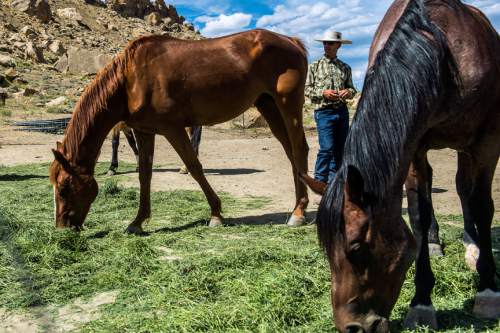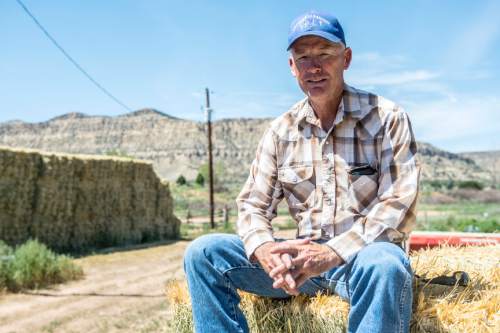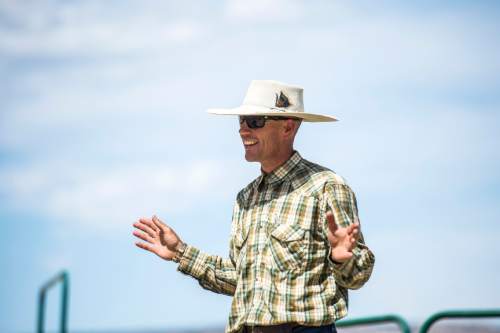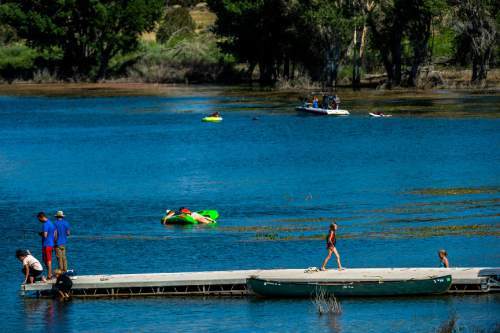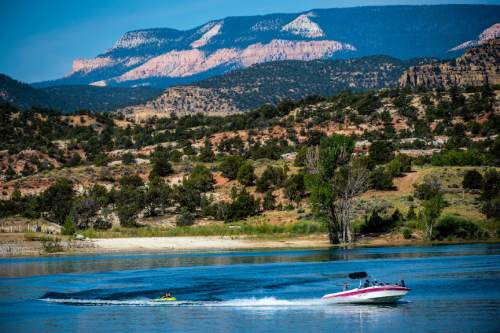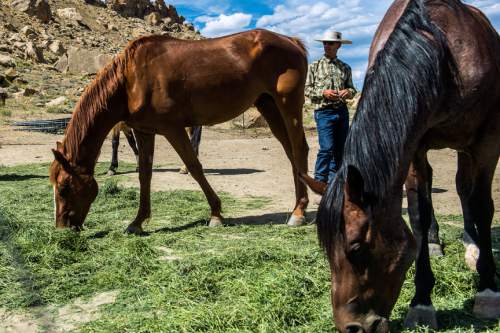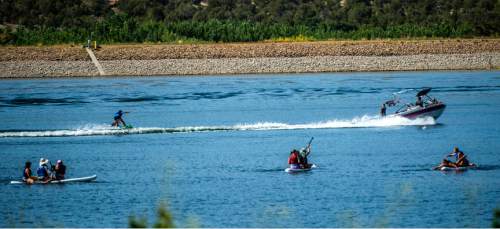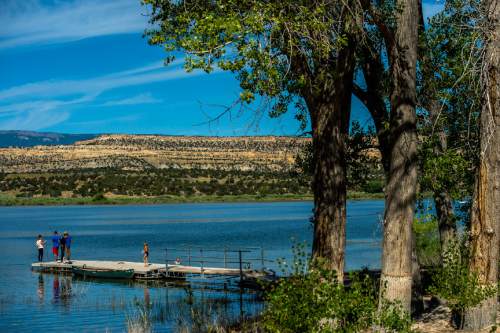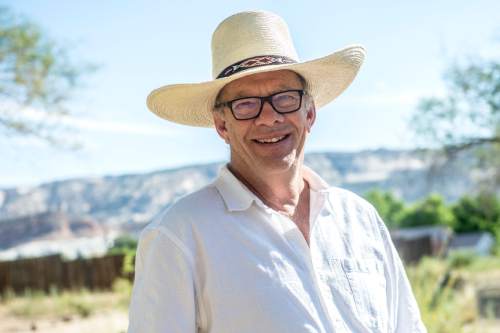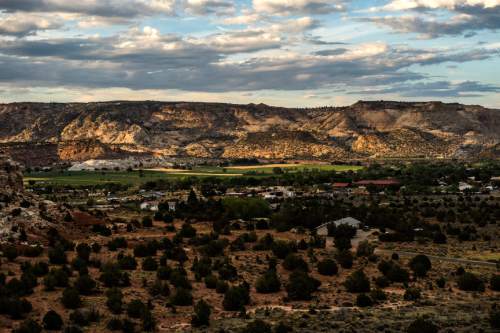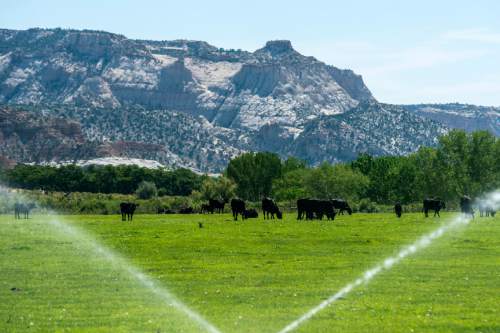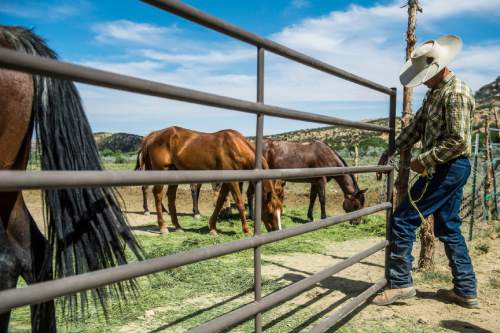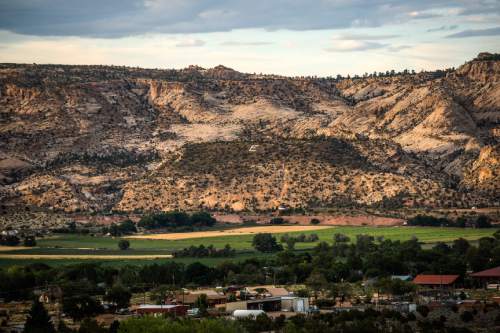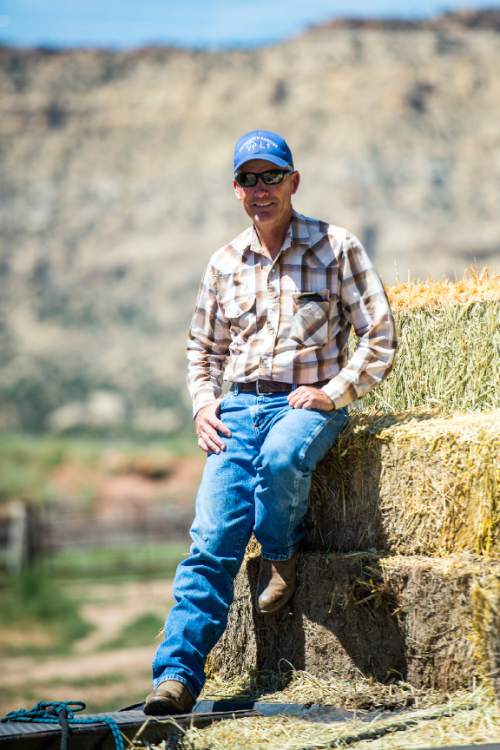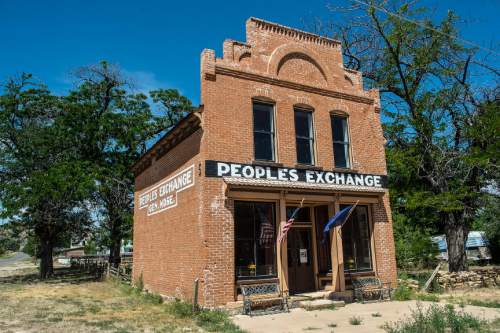This is an archived article that was published on sltrib.com in 2015, and information in the article may be outdated. It is provided only for personal research purposes and may not be reprinted.
Escalante • Dave and Erin Treanor's new business venture in this remote Utah town came at the crossroads of timing and location.
Transplants to Garfield County 11 years ago, they gravitated to Wide Hollow Reservoir to pursue their passion for paddling.
More often than not, they didn't spend much time on the water as campers from adjacent Escalante Petrified Forest State Park asked to borrow their kayaks and paddleboards.
So when Dave was laid off last year from Turn-About Ranch, inspiration struck. This spring, the Treanors, who have two young children, expanded their new horse-trail-riding business to rent watercraft at the reservoir. Both operations are flourishing, exceeding the couple's expectations.
The Treanors are a little bit of old Escalante (the horses) and a little bit of new Escalante (the paddleboards). But while they've worked out the dichotomy, their neighbors haven't.
The clash became apparent June 22 when the Garfield County Commission declared a state of emergency. The proclamation portrays Escalante, a town of 850, as a community fading away under the weight of federal land policies that put preservation ahead of extraction.
The Treanors figured they were having a banner year.
"It's an exciting time. We're dying? Really? That's a bummer," said Dave Treanor, a candidate for Town Council in a race in which three incumbents face re-election.
"Why send that message just when we are coming back? Most people here are really optimistic."
Treanor, owner of the guiding service called Rising DT Ranch, is among several Escalante business leaders frustrated with the commission's declaration. They believe the three-page resolution, which calls on federal land agencies to align their management with the county's priorities, exhibits a lack of vision for the future and could wind up harming Escalante's economic prospects by discouraging investment.
—
'It's a lie' • The emergency declaration claims the U.S. Bureau of Land Management, which operates the Grand Staircase-Escalante National Monument, and the U.S. Forest Service are to blame for the county's economic malaise because policies have "eliminated" multiple use.
Collapsing school enrollment in Escalante — down 67 percent in the town's middle and high school since President Bill Clinton's 1996 monument designation — is the main exhibit in the commissioners' case that Garfield's communities are withering.
In a speech before the San Juan County Commission last week, Town Council member Greg Allen personified the old guard — those who believe Clinton's monument permanently stunted their community. He urged the San Juan County Commission to fight the proposed designation of a national monument around Bears Ears and Cedar Mesa. Allen said claims that the Staircase monument spurs economic growth are distortions perpetrated by those developing tourism operations at the expense of traditional industries.
"There's no other way to say it. It's a lie," said Allen, an Escalante schoolteacher and LDS bishop whose family is involved with logging and ranching. "We are a constricting town. We are going down. I have no idea how we are going to survive."
Mormon settlers first platted the town 130 years ago on a gently sloping bluff above the Escalante River.
Relics of fruit orchards cluster behind homes and alfalfa fields spread from the river, whose banks are choked with invasive Russian olive and tamarisk among native cottonwoods and willow.
This bucolic valley is surrounded by scenic public lands that are simultaneously Escalante's chief asset and biggest source of rancor.
Residents are split about whether it is better to mine, drill and log these lands or preserve them for their ability to draw visitors looking to explore the historic town and nearby slot canyons, plateaus and folded sandstone of the Escalante region, named for the Franciscan missionary who passed through in 1776.
The town and neighbors, including Boulder and Cannonville, long survived on agriculture and traditional extractive industries. But that era was already in decline when Clinton made his 1996 announcement, which chafes leaders in Garfield and Kane counties to this day. Flexing his authority under the Antiquities Act, Clinton set aside 1.9 million acres stretching between Bryce Canyon and Capitol Reef national parks.
Many blasted the move as an election-year gambit conducted in secrecy that insulted the desires of locals, slammed the door on harvesting the Kaiparowits Plateau's massive coal reserves and sounded a death knell for surrounding communities.
—
New thinking • Newcomers and those remaking their careers —like the Treanors — are moving past coal.
Boulder resident Autumn Peterson wants to relocate her company from Fruita, Colo., to make high-end natural finishes in Escalante. Now she fears the emergency declaration will make it hard to get funding to set up a plant east of downtown, where she hopes to put 10 to 15 employees to work.
Two years ago, Karen and Reed Munson, a contractor, opened a hardware store so builders and locals wouldn't have to drive to Cedar City to buy tools and supplies.
Karen Munson, a former Escalante schoolteacher, figures the emergency declaration is just so much whining.
"That bugged me a lot. I refuse to be labeled a victim because of the Grand Staircase," she said. "I was unimpressed with their blaming our problems on the monument."
Munson believes the town has a bright future — as long as people heed the sign behind her counter that poses: "What's the best that can happen?"
"We have exceeded every sales goal we set," Munson said. "I've seen the building standards elevated. We sold 300 trees last year. The paint is just flying off the shelves."
She suspects the declaration could backfire. The town's new school principal, Bert Steele, suddenly has had trouble getting a construction loan approved.
Because housing is so tight in Escalante, the former Salt Lake City school administrator has been living with the Munsons since he moved here last summer.
But now Steele's plans to build a home have fallen into limbo.
Allen, Town Council member Louise Barnes and Garfield County Commissioner Dell Lefevre, a Boulder rancher who represents the eastern half of the county, did not respond to phone messages.
Contacted by phone, Escalante Mayor Jerry Taylor said he was too busy to be interviewed because of flooding at his house in Utah County.
The county's June 22 declaration instructed county staff to set up a meeting within 30 days with federal agencies, the governor's team and the Utah congressional designation to discuss the issues raised in the document. Such a meeting has yet to be arranged.
—
'Ideological scapegoating' • Escalante's plight is hardly unique in rural America.
Communities are struggling across the country, and some are pivoting toward recreation — a shift that makes those vested in agriculture and minerals uncomfortable.
"That economy has long since gone away — as it has in much of rural America," said Utah State University sociologist Richard Krannich. "That's happening in Iowa, not just public-lands states in the West.
"A lot of it has to do with technological advances that allow extractive industries to operate with few workers and the globalization of markets."
During her visit to Salt Lake City this month, U.S. Department of Interior Secretary Sally Jewell said many factors are responsible for the economic changes in places such as Garfield County, and it's easy and politically expedient to blame federal agencies.
Krannich calls it "ideological scapegoating."
"But there is also an underlying reality," Krannich said, "that the agencies were a lot more interested in resource extraction in the past than landscape preservation."
There is no denying Escalante is experiencing an uptick in tourism. Motel rooms are filling. Restaurants are busy. Outfitters are leading more clients into the backcountry. In the past few months, a new medical clinic and social hall have opened along Main Street.
Owners, including Chamber of Commerce President Dennis Waggoner, are confident the region's geological and cultural wonders, trout-filled streams, historic towns and slow pace will continue to lure a growing number of visitors.
Camera-toting tourists, many from Europe and Asia, arrive by tour bus, RV, motorcycle, bicycle and car on scenic State Road 12.
—
Chicken Little mentality? • The county's political leaders, however, see their glass as half empty.
Garfield County is 93 percent federal land. The Escalante Valley is an island in an ocean of mostly protected land administered by the Dixie National Forest and the BLM. County leaders argue federal agencies are advancing land-use changes that damage the "health, safety and welfare" of the residents and erode the region's "culture and customs."
Allen's presentation in Monticello illustrates the divide in Escalante, pitting natives against so-called "move-ins" — those who came to retire in a place with crisp air, stunning views and starry skies, or to operate businesses catering to visitors, including the Escalante Mercantile, Natural Grocery and Circle D Motel.
Even how you say the town's name is a point of contention. Allen mocked those who use the Spanish pronunciation.
"You know you are hearing someone who doesn't understand the community," Allen, who uses a traditional pronunciation that rhymes with the poker term "ante," told San Juan commissioners.
He accused tourism operators of buying up commercial buildings along Main Street and trying to take over the Town Council in an unwanted campaign to change the place.
Others blame town leaders for suppressing growth and innovation.
Builder Mark Austin, who has butted heads with local government for years, believes Escalante has put up unnecessary barriers to economic development and discouraged investment.
For example, the town took years to upgrade its culinary water and storm-water systems. As a result, runoff during monsoonal events regularly floods homes.
A moratorium was placed on new water connections until a few years ago. That reduced opportunities to build new homes and businesses.
And back in the mid-1990s, Escalante leaders passed on a chance to host the new monument headquarters. That facility — along with its $2.5 million payroll — wound up in Kanab.
Meanwhile, locals say, it is difficult to secure a skilled tradesman to wire a house, plumb a kitchen or hang a door.
Good jobs abound in town for those who acquire the necessary skills, but town leaders keep telling young people their future lies elsewhere.
Despite reports of a takeover, the town's old guard came out on top in Tuesday's primary election.
Allen turned out to be the top vote-getter, followed by two other incumbents. Treanor came in a not-too-distant fourth place, followed by Kevin Worlton, a former South Jordan police officer-turned-police-chief the Town Council fired earlier this year. He and his wife, Rachel, now operate a Main Street convenience store, hiking shuttle service and ATV rental business that employs 16.
Austin, the critic, was the one council candidate who didn't survive the primary cut.
—
Familiar gripes • Local leaders have a long list of complaints against federal land managers.
Chief among them: Cutting off long-held hopes of developing a vast deposit of Kaiparowits Plateau coal. Also: There are few visitor services, paved roads, signs and campgrounds in the preserve. Rangeland health is suffering. The county has to provide emergency services with little compensation. And federal bosses, they assert, aren't hiring enough locals.
Monument managers have little appetite for arguing with county leaders, but they dispute most of the emergency declaration's assertions targeting the BLM.
According to the document, federal land managers refuse to coordinate with the counties and the state. They propose harmful changes to land-management policy without explaining their impact. Finally, "pleas for protection of [the counties'] families have fallen on deaf federal ears." The agency, the county alleges, even has failed to deliver on promised education and science programs.
"That's the perception," said monument spokesman Larry Crutchfield. "I have to treat it like it is reality.
"The BLM is participating with the counties, looking for ideas of how to stimulate the economy and what we can do to improve quality of life, bring in industry and explore ideas for creating economic well-being."
Grazing permits have remained steady with minimal changes since the monument was created, Crutchfield noted. Actual stocking numbers do rise and fall, he acknowledged, but that's due to forage availability, which fluctuates with rain.
And the BLM insists it accommodates commercial activity on the monument.
"We keep hearing that filming is not allowed, [that] we killed the film industry on the monument," Crutchfield said. "There are restrictions on the size of productions. You are not going to have a 'Ben Hur' movie. But we have companies come in all the time shooting."
The monument, meanwhile, has more than tripled the number of special recreation permits for commercial guiding since 2000 to more than 110.
All the permits have gone to local small businesses — including Escalante Canyon Guides, Excursions of Escalante and High Adventure — based in nearby towns, rather than the corporate concessionaires associated with national parks.
Since the monument's creation, Garfield has become Utah's most tourism-dependent county, with more than half the economic activity linked to serving visitors, according to state economic data.
"I must be the worst [public affairs officer] ever," Crutchfield said. "I keep hearing you can't ride ATVs, you can't hunt. For 10 years we have been trying to get the word out. We want the public out there enjoying public lands."
—
A 'second Moab' • While federal land managers point to tourism growth in the monument, Escalante old-timers argue tourism isn't enough to sustain their community.
"For business owners, that might be where the future lies, but not for the people who work for them," said Link Chynoweth, a fifth-generation rancher and a Mormon bishop. "It's a pretty delicate balance to keep the community alive and thriving, but how many jobs do you want to come here before you change the characteristic of the town?"
Garfield County's largest employer is now Ruby's Inn at the entrance to Bryce Canyon, where many of the 400 workers are from Eastern Europe.
"You can't tell me those wages are circulating here in the economy," said Justin Fischer, the county's economic-development director.
And some fear the coming of a "second Moab," a one-time uranium boomtown that has become the West's top recreation mecca at a steep cost to the quality of life for locals.
Once smaller than Escalante, Moab is seen as a victim of its own success at attracting visitors, which numbered 2.5 million last year. Traffic crowds its streets and nearby national parks. Full-time residents have few places to live as the housing stock converts to second homes and vacation rentals. And services and infrastructure are overrun.
"Look at them now. That's sad," said Shannon Steed, an Escalante native whose brothers operated a lumber mill outside of town until it shuttered a decade ago, taking three dozen jobs with it. "It's coming. People don't like Moab and they come here."
Still, even Steed is cashing in on the tourism trade — and restoring the town's architectural heritage while he's at it. He runs a popular steakhouse and hosts bus tours and a guest ranch in renovated structures on the historic Hobe Alvey farm.
He and his wife, Jennifer, renovated the 77-year-old cinema in the center of town and opened it July 4 as the Escalante Showhouse, where they serve meals and stage performances. On opening night, the Showhouse hosted Escalante's Class of 1975 high school reunion, whose members were graduating around the last time a movie was screened in the building.
A huge American flag hangs on the back stage, which is framed with a proscenium covered in ancient lumber Steed salvaged from Alvey barns. He crafted the tables and counters from the building's 2-by-10-inch floor joists.
"I should get notice that I'm the biggest recycler in Escalante," he joked while showing off his building. "I don't know what in Sam Hill I'm going to do with 185 vintage seats."


